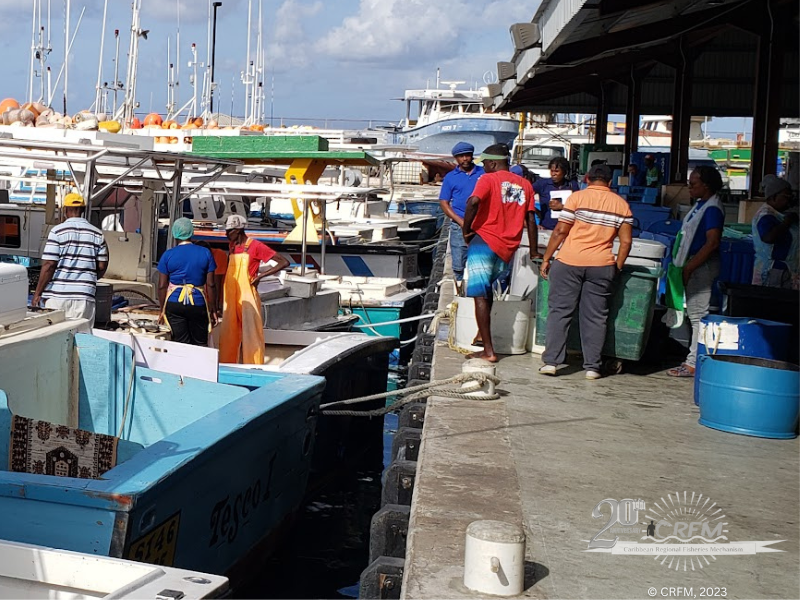Sargassum seaweed influxes have been a bane to the Caribbean since 2011, but the Caribbean Regional Fisheries Mechanism (CRFM) and Plant & Food Research (PFR), a New Zealand government-owned Crown Research Institute, are advancing a regional project to turn Sargassum into innovative products that will create jobs and income as well as contribute to building the region’s climate resilience and mitigate the negative impacts of Sargassum in the region.
During 2023, the CRFM and Plant & Food Research — in partnership with other public and private sector institutions in the Caribbean region—will focus on lab-scale work and field trials to develop suitable prototype products from Sargassum for commercial use.
A team from the CRFM Secretariat and Plant & Food Research recently visited Trinidad and Tobago and Barbados to meet with key stakeholders as they advance the second phase of the project titled, Developing Sargassum Products for Climate Resilience in the Caribbean.

CRFM and PFR representatives meet partners in the Caribbean to advance Sargassum Project. Here, they meet with officials in Barbados.
Milton Haughton, Executive Director of the CRFM, said: “We had a very productive mission to Barbados and Trinidad and Tobago meeting with partners and stakeholders with an interest in creating value-added products from the Sargassum. We are very confident that we can work together with interested partners to develop viable products and generate jobs and income streams for our people from this natural resource. Our focus now is on developing and testing these prototype products and processes using the Sargassum. We will also be developing a product commercialization strategy.”
Rosie Paterson-Lima, International Development Programme Manager at Plant & Food Research, said her organisation’s involvement was made possible by funding from the New Zealand Government International Development Cooperation Programme.
“It is exciting for us to work in partnership in the region on this challenge and to bring our expertise in agronomy, value chain analysis and commercialisation. We are delighted to have Barbadian Dr Terrell Thompson join the project delivery team recently as a consultant. Dr Thompson is a chemicals and materials engineer with impressive expertise and experience in the Sargassum industry,” Paterson-Lima said.

CRFM Executive Director, Mr. Milton Haughton (right), Rosie Paterson-Lima, International Development Programme Manager at Plant & Food Research (centre) and Beverley Sutherland, Project Coordinator (left).
The mission spanned January 30 to February 11 2023. The purpose of these engagements was to share information on the Project and to explore opportunities for collaboration and strengthened partnerships under the project.
In Trinidad and Tobago, the team met representatives of the Caribbean Agricultural Research and Development Institute (CARDI), the Caribbean Public Health Agency (CARPHA), the Caribbean Industrial Research Institute (CARIRI), the Engineering Faculty of the University of the West Indies, the Association of Caribbean States, the Caribbean Private Sector Organisation (CPSO), and representatives of the Government of Trinidad and Tobago.
In Barbados, the parties met with officials of the Ministry of Agriculture, Fisheries Division, and the National Conservation Commission of the Government of Barbados, UWI – Cave Hill Campus, the European Union, CARDI, UNDP, FAO, the Fisherfolk Organisations and the Samuel Jackman Prescod Institute of Technology.

CRFM and PFR representatives meet with officials from the National Conservation Comission of Barbados.
Sargassum blooms in the Atlantic have already begun, and they are expected to inundate the Caribbean region by April 2023. The Outlook of 2023 Sargassum blooms in the Caribbean Sea and Gulf of Mexico, released by the University of South Florida Optical Oceanography Lab this month, revealed that, “The overall Sargassum quantity in the Atlantic Ocean doubled from December 2022 to January 2023 (8.7 million tons), again setting a new record (previous January record was 6.5 million tons in 2018).” The outlook noted that this is the second consecutive monthly doubling of Sargassum, and all indications are that the Sargassum biomass will continue to accumulate and migrate westward over the next several months. Climate change has been identified as one of the major contributing factors to this phenomenon.

Sargassum inundation defaces coastline of Saint Lucia fishing community (June 2022).
The CRFM and Plant & Food Research have successfully completed the first phase of the project, during which they worked with partners in Barbados, Belize, Jamaica, and the Dominican Republic to conduct Sargassum raw material safety testing and review of potential products that could be made from the Sargassum.
The final phase is outreach and supply chain development, which would entail the dissemination of a model to industry stakeholders and the wider Caribbean.
(CRFM)




